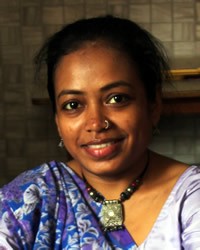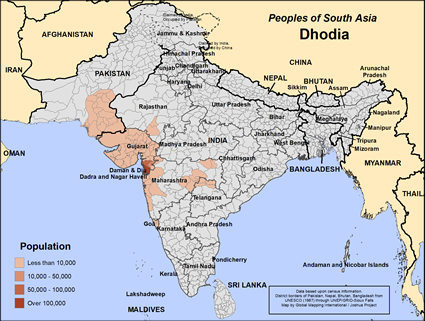The Dhodia are located in the extreme southeastern districts of Gujarat, a state in northwestern India, though a smaller number of them live further west over the Pakistani border. The Dhodia are the highest-ranking tribe and the third largest tribal group in Gujarat. They speak Dhodia, a Bhil language. The Dhodia are related to the many Bhil tribes. The name "Bhil" comes from the word billee, which literally means "bow." The bow is the characteristic weapon of most Bhil tribes. Ironically, the Dhodia, unlike their Bhil relatives, do not use bows and arrows. The Dhodia consider themselves to be of a higher class than the neighboring Bhil groups. They will not marry other Bhil or even eat with them. Some exceptions are allowed, however, with the Chodhari Bhil. Long ago, prosperity within Gujarat State attracted people from all the surrounding states. Gujarat became a target of the Maratha tribes, who made annual raids to the region for several years. Eventually, the Muslims fortified the area east of Surat in order to reap its economic benefits. War continued between the Moghals, the Maratha, and the Portuguese over the Gujarat territory. By 1817, the British had risen to power. In the years that followed, they attempted to mend what the Maratha had left by dispersing farmland among the settlers. In 1930, Mahatma Gandhi demanded the British to withdraw from India. The Dhodia, a non-aggressive people, retreated deeper into the hills during the conflict.
They have more than one wife when they can afford it. The wives are "bought" while they are still girls. In times past, it was customary to take the bride to the groom's house for the wedding. Today, however, the young couple generally travel to the bride's house to be married. A widow usually remains a part of her husband's family by marrying her deceased husband's brother. The Dhodia participate in festivals alongside the Hindus who live nearby. They are not really community-minded, but only come together for such things as annual communal fishing and religious feasts. Village leaders only perform certain social duties. Most Dhodia have given up the nomadic lifestyles of their ancestors and have settled into farming. Forest labor, trade labor (in the cities), hunting, and fishing are secondary to agriculture. Some live in the Surat district, an area well known for its rich soils and fine cotton crop. Others live in areas where, because of the heavy rainfall, they are able to cultivate rice. Still others live in the less fertile, highland areas. The Dhodia go to the markets to trade their crops for clothing. The women wear blouses under dark green or red cotton saris (long pieces of cloth that are wrapped around the waist and over one shoulder). They also wear necklaces made of lead beads and rupee coins, and silver anklets. Most of the men wear either a "Gandhi" cap or a turban wrapped out of a piece of cloth. Shorts have also become popular among the men. Dhodia houses are usually scattered near the streams so that they might easily fish and draw water for themselves and their cattle. The homes are typically built by hired labor. They are small bamboo huts made with tiled roofs. The poorer Dhodia live in mud huts that they build themselves. The doors always face north in order to prevent interaction with evil spirits.
The great majority of the Dhodia Bhil practice ethnic religions. They have deep-rooted beliefs in demons and witches. They worship groups of deities made of shapeless pieces of stone or wood. The Dhodia have no temples or places to hold their religious ceremonies. They have only a few stones that have been painted and placed under trees. They believe that the supernatural beings dwell there.
Many Dhodia are addicted to alcohol and will sell all they possess for a drink. They need to experience the liberating power of Jesus Christ.
Ask God to raise up prayer teams who will break up the soil through worship and intercession. Pray that the Lord of the harvest will send forth faithful laborers to live among the Dhodia and teach them of God's love leading to a church planting movement. Ask God to grant wisdom and favor to mission agencies focusing on the Dhodia. Ask God to give the Dhodia believers boldness to share the Gospel with their own people.
Scripture Prayers for the Dhodia in Pakistan.
https://en.wikipedia.org/wiki/Dhodia
| Profile Source: Joshua Project |












